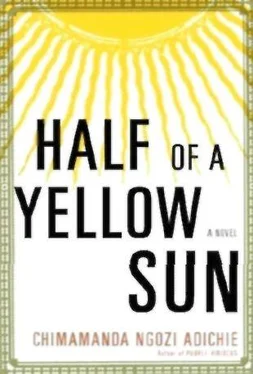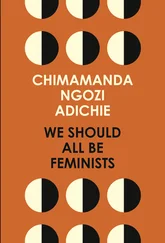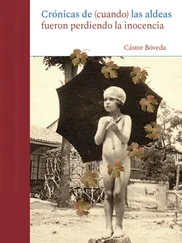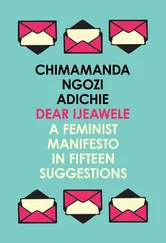She arched her eyebrows. "We? The world was silent when we died?"
"I'll make sure to note that the Nigerian bombs carefully avoided anybody with a British passport," he said.
Kainene laughed. She laughed often these days. She laughed as she told him about the motherless baby who still clung to life, about the young girl that Inatimi was falling in love with, about the women who sang in the evenings. She laughed, too, on the morning that he and Olanna finally saw each other. Olanna spoke first. "Hello, Richard," she said and he said, "Olanna, hello," and Kainene laughed and said, "Richard couldn't invent any more trips."
He watched Kainene's face carefully for withdrawal, for returning anger, for something. But there was nothing; her laughter softened the angles of her chin. And the tension he had expected, the weight of memory and regret that would come with seeing Olanna again in her presence, were absent.
7. The Book: The World Was Silent When We Died
For the epilogue, he writes a poem, modeled after one of Okeoma's poems. He calls it:
"WERE YOU SILENT WHEN WE DIED?"
Did you see photos in sixty-eight Of children with their hair becoming rust: Sickly patches nestled on those small heads, Then falling off like rotten leaves on dust?
Imagine children with arms like toothpicks. With footballs for bellies and skin stretched thin. It was kwashiorkor - difficult word, A word that was not quite ugly enough, a sin.
You needn't imagine. There were photos Displayed in gloss-filled pages of your Life. Did you see? Did you feel sorry briefly, Then turn round to hold your lover or wife?
Their skin had turned the tawny of weak tea And showed cobwebs of vein and brittle bone; Naked children laughing, as if the man Would not take photos and then leave, alone.
Olanna saw the four ragged soldierscarrying a corpse on their shoulders. Wild panic made her woozy. She stopped, certain it was Ugwu's body, until the soldiers walked quickly, silently, past and she realized that the dead man was too tall to be Ugwu. His feet were cracked and caked in dried mud; he had fought without shoes. Olanna stared at the soldiers' retreating backs and tried to calm her queasiness, to shrug off the foreboding that had fogged her mind for days.
Later, she told Kainene how afraid she was for Ugwu, how she felt as if she were about to turn a corner and be flattened by tragedy. Kainene placed an arm around her and told her not to worry. Madu had sent word to all battalion commanders to look for Ugwu; they would find out where he was. But when Baby asked, "Is Ugwu coming back today, Mummy Ola?" Olanna imagined it was because Baby, too, had the same premonition. When she returned to Umuahia and Mama Oji gave her a package somebody had delivered, she immediately wondered if it contained a message about Ugwu. Her hands shook as she held the brown-wrapped carton creased with excessive handling. Then she noticed Mohammed's writing, addressed to her in care of the University of Biafra, in long elegant sweeps. Inside, she unfolded handkerchiefs, crisp white underwear, bars of Lux soap, and chocolate, and she marveled that they had reached her intact, even sent through the Red Cross. His letter was three months old but still smelled faintly of sweet musk. Detached sentences stuck to her mind.
I have sent so many letters and am unsure which has reached you. My sister, Hadiza, got married in June. I think constantly of you. My polo game is much improved. I am well and know you and Odenigbo must be too. Do try and send word back.
She turned a chocolate bar around in her hand, stared at the made in Switzerland, fiddled with the silver foil. Then she flung the bar across the room. Mohammed's letter incensed her; it insulted her reality. But he could not possibly know that they had no salt and Odenigbo drank kai-kai every day and Ugwu was conscripted and she had sold her wig. He could not possibly know. Yet she felt angry that the patterns of his old life remained in place, so unquestioningly in place that he could write to her about his polo game.
Mama Oji knocked; Olanna took a deep calming breath before she opened the door and gave her a bar of soap.
"Thank you." Mama Oji held the soap with both hands and raised it to her nose and sniffed it. "But that package was big. Is this the only thing you will give me? Is there no canned food there? Or are you saving it for your saboteur friend Alice?"
"Ngwa, give me back the soap," Olanna said. "Mama Adanna will know how to be appreciative."
Mama Oji swiftly raised her blouse and tucked the soap into her threadbare bra. "You know I am grateful."
Raised voices came from the road, and they both went outside. A group of militia members holding machetes were pushing two women along. They cried as they staggered down the road; their wrappers were ripped and their eyes reddened. "What did we do? We are not saboteurs! We are refugees from Ndoni! We have done nothing!"
Pastor Ambrose ran out to the road and began to pray. "Father God, destroy the saboteurs that are showing the enemy the way! Holy-spirit fire!"
Some of the neighbors hurried out to spit and aim stones and jeer at the backs of the women. "Sabo! God punish you! Sabo!"
"They should throw tires round their necks and burn them," Mama Oji said. "They should burn every single saboteur."
Olanna folded Mohammed's letter, thought of the slack half-exposed bellies of the women, and said nothing.
"You should be careful with that Alice," Mama Oji said.
"Leave Alice alone. She is not a saboteur."
"She is the kind of woman who will steal somebody's husband."
"What?"
"Every time you go to Orlu she will come out and sit with your husband."
Olanna stared at Mama Oji, surprised, because it was the last thing she had expected to hear and because Odenigbo had never mentioned
that Alice spent time with him when she was away. She had never even seen them speak to each other.
Mama Oji was watching her. "I am only saying that you should be careful with her. Even if she is not a saboteur, she is not a good woman."
Olanna could not think of what to say She knew that Odenigbo would never touch another woman, had quietly convinced herself of this, and knew too that Mama Oji nursed a deep resentment of Alice. Yet the very unexpectedness of Mama Oji's words nagged her.
"I will be careful," she said finally, with a smile.
Mama Oji looked as if she wanted to say something else but changed her mind and turned to shout at her son. "Get away from that place! Are you stupid? Ewu awusa! Don't you know you will start coughing now?"
Later, Olanna took a bar of soap and knocked on Alice 's door, three sharp raps in quick succession to let Alice know it was she. Alice 's eyes looked sleepy, more shadowed than usual. "You're back," she said. "How is your sister?"
"Very well."
"Did you see the poor women they are harassing and calling saboteurs?" she asked, and before Olanna could respond, she continued, "Yesterday it was a man from Ogoja. This is nonsense. We cannot keep beating people just because Nigeria is beating us. Somebody like me, I have not eaten proper food in two years. I have not tasted sugar. I have not drunk cold water. Where will I find the energy to aid the enemy?" Alice gestured with her tiny hands, and what Olanna had once thought to be an elegant fragility suddenly became a self-absorbed conceit, a luxurious selfishness; Alice spoke as if she alone suffered from the war.
Olanna gave her the soap. "Somebody sent a few bars to me."
"Oh! So I will join those using Lux in this Biafra. Thank you." Alice 's smile transformed her face, brightened her eyes, and Olanna wondered if Odenigbo found her pretty. She looked at Alice 's yellow-skinned face and narrow waist and realized that what she had once admired now threatened her.
Читать дальше












